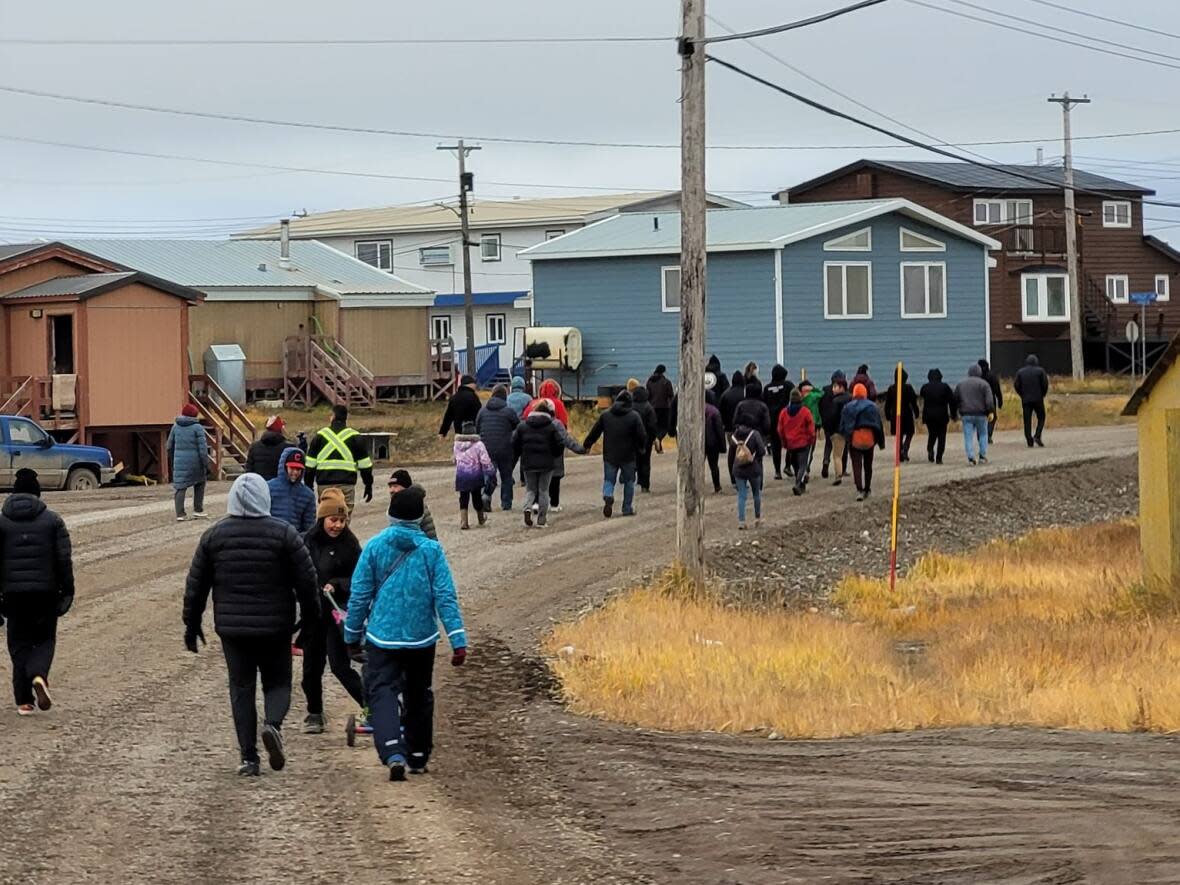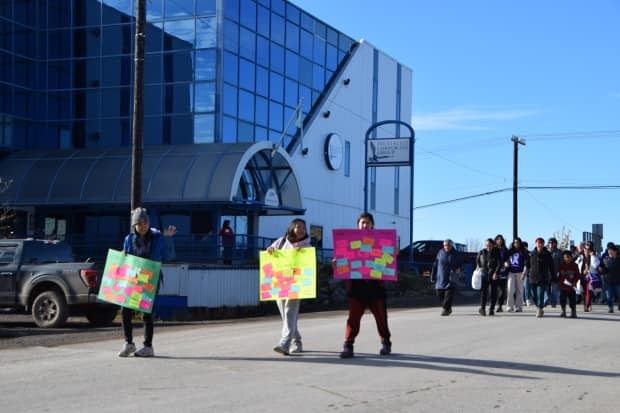'A storm is brewing': Counsellors head to Tuktoyaktuk as mayor says town is in a mental health crisis

WARNING: This story discusses suicide.
It's been a difficult few years, and a particularly hard past several months in the community of Tuktoyaktuk, N.W.T., says the mayor.
Right now, the community is working on ways to address a mental health crisis, one that seems to especially loom over young people in the region.
In the last year, there have been four deaths by suicide, all which happened in the last three months, said Mayor Erwin Elias.

"We've been going through quite a bit as a community," said Elias. "This is a huge concern — an emergency for our community."
On Wednesday, a vigil and walk was held in Tuktoyaktuk and in Inuvik, hundreds gathered to walk from the school to the town pavilion and to gather for a vigil as well.
Elias said in Tuktoyaktuk, the community of about 1,000 people is trying to figure out what can be done to better support people.
"It's really challenging right now," he said. "This is definitely something that you never prepare for."
N.W.T. health authority staff head to community
In an email from the Department of Health, attributed to Health Minister Julie Green, she confirmed she has spoken with Elias "and exchanged emails about this matter."
Green said as a short-term plan, counsellors were being sent to Tuktoyaktuk to provide support, with Northwest Territories Health and Social Services Authority staff heading there starting this weekend.
Green also acknowledges a proposal for the Suicide Prevention Fund that was submitted by the town's community corporation on Sept. 20.
"Our team will provide any support we can to expedite approval of this important proposal," she said.
As for the long-term plan, Green said the chief operating officer of the health authority's Beaufort Delta Region travelled to Tuktoyaktuk along with the regional Community Counselling Program manager to "hear from the community about their needs and to determine next steps."

The N.W.T. health authority will then "explore options" to provide long-term support, based on these conversations, she said.
"Suicides are devastating. The impacts in small northern communities are often far reaching and long lasting, and there is no simple solution," Green said. "Our goal as a government is to listen and provide as much support and compassion as possible to communities in times like these."
Problem — and solution — has many aspects, Elias says
Elias said the mental health crisis isn't a standalone problem; other "obstacles" weigh on people, like housing issues or homelessness.
Elias said COVID-19 lockdowns may have made people's morale worse at times.
"Part of the culture is to gather, and that was all taken away, we couldn't gather, we couldn't dance, we couldn't sing. We were told to stay away from each other," he said.
"I was asking [the government], and telling them that, we have a storm brewing here with mental health. So what is the plan when we come out of it?"
For the community's part, he said they've been putting on group gatherings like sing alongs, meet ups with mental health workers, bringing in motivational speakers and cookouts. He said there's been support from local businesses in the community as well. But, the events don't seem to always be attracting the targeted group, Elias said.
"Right now, we're trying to figure out what we need to do," he said. "It don't matter what the obstacles may be, but the biggest thing is to understand what the age group that we're targeting needs."
Elias said he also noticed an increase in alcoholism, but he said he worries about making Tuktoyaktuk a "dry" community — banning alcohol — because he said it may cause more harm than good, as bootleggers crop up making prices for alcohol soar and people begin to "drink anything."

He said another impact on people's mental health can be linked to not having certain facilities like an elders's long-term care home, meaning some people looking to visit their grandparents can't, as elders needing care are often sent out of the community.
"For some families that want to go see their grandparents that are in long term, it's a burden on them, too."
One particularly helpful resource the community received, he said, was on-the-land funding, where people weren't given cash but vouchers to buy gas and food to be out on the land.
"We've seen people going out in the land that have never been out in the land in years," he said.

Elias said it would be helpful to have a community economic development officer in Tuktoyaktuk, where people can ask for funding for specific items like materials for sewing, or to start a small business.
"We've been pushing for that. And, you know, I'm happy to say that, you know, that's gonna be coming back to the community really soon here."
"Keeping the people busy, I think, is key."
'We need to talk about it'
Ruthie Goose is one of the organizers of the vigil in Inuvik, and is a member of the Mental Health Awareness Working Group.
She said it's time people begin to have frank conversations with each other about mental health.
"In the past, everybody has not wanted to talk about suicide, suicide was pushed under the rug," Goose said.
"We need to talk about it, we need to use it at our kitchen tables … because if we don't talk about it, we're never ever going to get to the end of this, we need to talk about it."
Meanwhile, Rachel Schooley, who also is with the Mental Health Awareness Working Group, said some resources, like help lines, need to be bolstered to help establish a level of trust between mental health workers and people seeking them out.
"They don't know the people that are answering the phone. There's no trust there. There's no relationship there," she said.
"Making it accessible for Indigenous counsellors to be in the community, local people to be on the end of those support lines is really important. There's a lot of red tape, preventing those services from being offered right now."
For one, Schooley thinks a master's degree shouldn't necessarily be needed to become a mental health resource in the region.
"Knowledge of the communities and their needs and their people is what's needed. And so making sure that those resources are utilized is more important than ever," Schooley said.
Schooley said in terms of crisis response, they've been hearing from young people that they also want help monitoring social media, in case friends show signs of distress in their posts.
And she said, elders in the community can also play a role in shaping available resources too.
"We've got some pretty amazing elders and community members that can shape what services look like," Schooley said. "It's just, we need to be heard."


